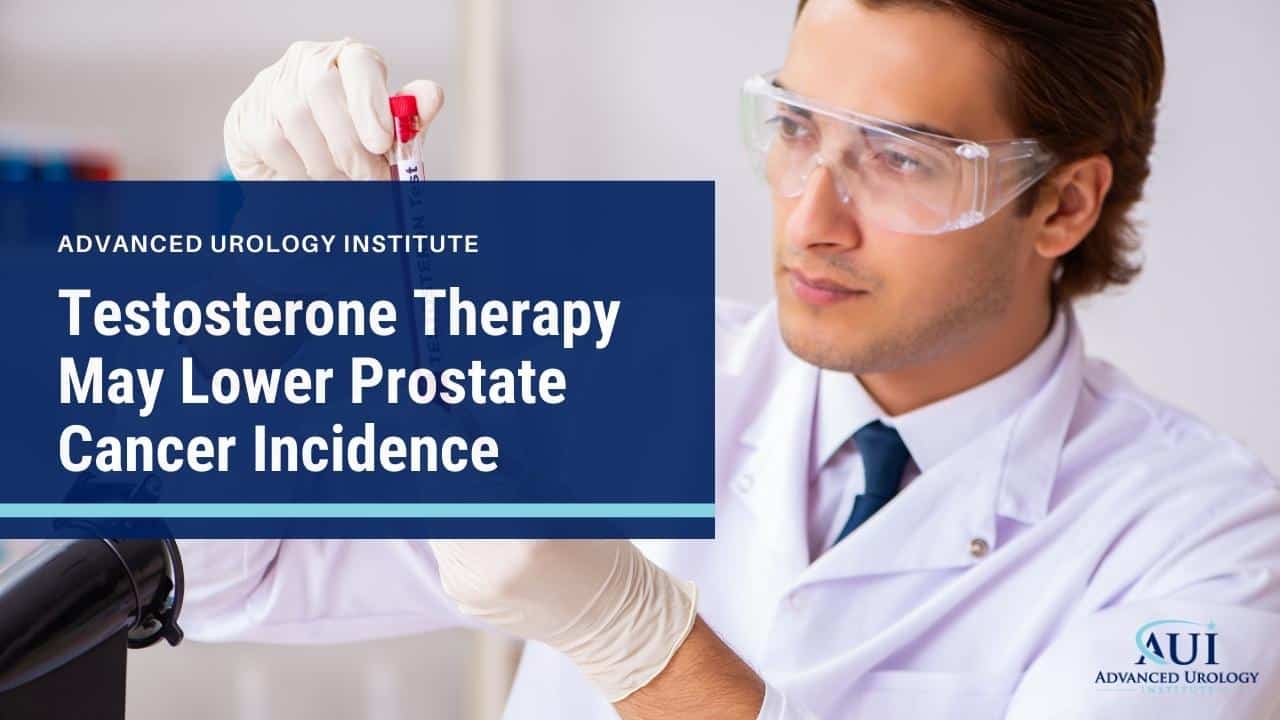Testosterone Therapy May Lower Prostate Cancer Incidence
 Testosterone replacement therapy (TRT) may help to reduce the risk of prostate cancer. According to a case-control study authored by Stacy Loeb, MD, MSc, of New York University, men who undergo testosterone replacement therapy (TRT) have lower risk of prostate cancer than those who do not undergo the therapy. Plus, the study found that testosterone therapy decreases the risk of aggressive prostate cancer, which is the form of the cancer that usually requires treatment.
Testosterone replacement therapy (TRT) may help to reduce the risk of prostate cancer. According to a case-control study authored by Stacy Loeb, MD, MSc, of New York University, men who undergo testosterone replacement therapy (TRT) have lower risk of prostate cancer than those who do not undergo the therapy. Plus, the study found that testosterone therapy decreases the risk of aggressive prostate cancer, which is the form of the cancer that usually requires treatment.
Linking testosterone level to prostate cancer
The New York University study was based on the National Prostate Cancer Register of Sweden and included all the 38, 570 cases of prostate cancer diagnosed in Sweden from 2009 to 2012, together with 192,838 age-matched men without prostate cancer.
During the research, 284 prostate cancer patients (1%) and 1378 healthy men (1%) completed prescription forms for TRT. Then following a multivariable analysis, it was established that exposure to TRT did not produce increased prostate cancer risk.
On the contrary, TRT exposure resulted in reduced risk of the cancer within the first year and decreased the risk of the aggressive type of the disease after the first year of therapy.
Need for more studies
While the above study by New York University into the link between TRT and risk of prostate cancer was not conclusive, it demonstrated a reduced risk of the cancer after testosterone therapy. Besides, due to the increased administration of TRT in recent years, this study generated more issues that need further studies.
For instance, due to the more favorable-risk of prostate cancer in men who receive the therapy, the study pointed to the need for increased prostate cancer screening in men undergoing TRT. Also, it pointed to several possible biologic mechanisms involved in aggressive disease, including the role of testosterone in normal functioning of the prostate and epithelial cell differentiation.
Efficacy of testosterone therapy in several studies
Another study presented at the Sexual Medicine Society of North America 18th Annual Fall Scientific Meeting in San Antonio, Texas reported that hypogonadal men who receive TRT have reduced incidence of prostate cancer than those not receiving the therapy. The study also found that the form of prostate cancer diagnosed in recipients of testosterone therapy is less severe than the form diagnosed in men unexposed to the therapy.
The study was conducted in 400 hypogonadal men (those with testosterone level of 350 ng/dL or less) and who received testosterone undecanoate 1000 mg every 3 months for up to 10 years. It also involved a control group of 376 hypogonadal men who were not receiving TRT. A median follow-up of 8 years was done, where 9 men in the TRT group (2.3%) were diagnosed with prostate cancer compared to 26 men (6.9%) in the control group.
The diagnosed men in the TRT group underwent radical prostatectomy (RP). All of them except one patient had a Gleason score of 6 or less. In fact, most had a predominant Gleason score of 3 and all had tumor grade G2 and tumor stage T2.
On the contrary, in the control group, 18 required radical prostatectomy alone, 6 required both RP and radiation, while 2 required radiation. Plus, 26 patients in the control group had a Gleason score above 6, 2 had a score of 3, 20 had a score of 4, and 4 had a score of 5. The tumor grade was G2 in 6 patients and G3 in 20 patients; while in terms of tumor stage, 1 patient had stage T2 with 25 were at stage T3.
In the testosterone group, all the cancer cases were diagnosed within the first year. This suggested that the tumors had been present before the therapy was initiated. Since low testosterone is linked with low PSA, the cancer was probably not detected before testosterone therapy due to hypogonadism. The detection within one year of treatment was due to increasing levels of testosterone, which brought out occult cancer.
There are several other studies that have produced similar reports. For example, a population-based matched cohort study of men aged 66 years or older by the University of Toronto demonstrated that testosterone exposure reduces the risk of prostate cancer by up to 40-percent.
The research in Ontario, Canada by Christopher J.D. Wallis, MD, PhD, and colleagues was published in the Lancet Diabetes Endocrinology (2016;4:498-506) and involved exposure of the men to the highest tertile testosterone and comparing the results with controls. During the study 10,311 men received TRT while 28,029 men did not. Follow-up was made after 5.3 years in the TRT group and after 5.1 years in the control group.
Prompt prostate cancer diagnosis and treatment
Are you a man over the age of 50 years and would like to begin prostate cancer screening? Or are you having urinary issues and suspect you could be developing a prostate-related disorder?
At Advanced Urology Institute, we have assembled a skilled, experienced team of board-certified urologists to help diagnose and treat prostatic issues, including prostatitis, enlarged prostate and prostate cancer.
Our state-of-the art prostate cancer center is supplied with the latest equipment and technology to deliver prompt diagnosis and safe, effective treatment of prostatic problems. For more information on prostate cancer and other urologic disorders, visit the site AdvancedUrologyInstitute.com

